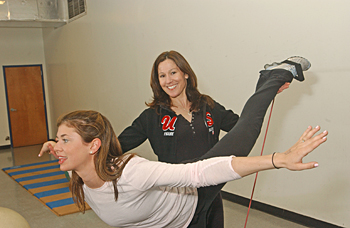The award was presented May 3 during the President's Council on Physical Fitness and Sports Award luncheon in Washington, D.C. The event is held in conjunction with Olympic Week in America, which is celebrated in elementary schools nationwide to focus on the Olympic movement.
The [James] “Doc” Counsilman Award is given annually to a coach who uses scientific techniques and equipment as an integral part of his or her coaching methods, or has been innovative in the use of sports science.
In a March 30 USOC press release, Arbour was described as “a rated figure skating coach through the Professional Skaters Association, a licensed physical therapist, a certified personal trainer, an off-ice strength and conditioning coach and a doctoral candidate in biomechanics and movement science.”
These qualifications enable Arbour to “bring a level of knowledge to working with figure skaters which few coaches possess,” and to use “sports science in her coaching to help skaters acquire the ability to skate their programs at their best, identify injuries early to minimize the interruption to training and to educate skater's parents and other coaches,” the USOC statement said.
“My off-ice conditioning is geared for the figure skater and includes high-intensity interval workouts, strength training and balance, agility and flexibility exercises,” Arbour said. “I try to help prevent injuries and help skaters get into really good shape.”
A 1993 UD graduate with a master's degree in physical education, Arbour said she enjoys the opportunity to work with skaters who train at UD, including Kimmie Meissner, winner of the International Skating Union's world title in 2006 and the 2007 United States Figure Skating championship.
“Even though it is a highly competitive environment, the skaters really do support each other,” Arbour said. “They are so self-motivated. It's great to be part of this.”
Arbour usually works with about 10-15 skaters each day.
Personalized training begins when Arbour meets a skater for the first time and performs an assessment of that person's strengths and weaknesses to help determine how the half-hour training sessions that follow will be conducted.
“We gear the training to complement their performance on the ice,” Arbour said. “I know how intense their on-ice training is, so I try not to take too much out of them during their off-ice workouts. I don't want them to be too tired when they go back on the ice.”
Arbour said that the competitive skating season begins each fall, culminating in national, world and Olympic competitions in January and February.
“About mid-March, skaters start to work on new programs, but not in a peak-training condition, because skaters can only maintain peak condition for two or three weeks at most,” Arbour said. “Summer also is a busy time because younger skaters are not in school and can devote more time to working on new jumps and programs with an eye on the fall competitions.”
The off-ice training routine, which includes working with stability equipment such as wobble boards and large air- or foam-filled balls, helps skaters develop the skill that give them balance on the ice, Arbour said.
“Skaters make what they do look easy, but by the end of their competitive program, they are at maximum aerobic intensity,” Arbour said. “Physiologically they are at the same level of intensity as a someone who has just run a competitive mile race, but instead of collapsing, they skate around, wave to the crowd and look graceful.”
Arbour said she was surprised and honored to learn that she was the winner of the award that memorializes [James] “Doc” Counsilman, the legendary coach of swimmers such as Mark Spitz and John Kinsella. In 1979, at age 58, Counsilman became the oldest person at the time to swim the English Channel.
“I love what I do,” Arbour said. “Receiving the award is a really big honor me for and our program at UD. I was thrilled to win.”
Jack O'Neill, assistant professor of health and exercises sciences and co-director of the UD Ice Skating Science Development Center, said that Arbour's background as a former skater at UD and her experience as a professional in the field enable Arbour to create a special off-ice training environment for the current generation of skaters at UD.
“What she brings is somewhat unique because it combines her comprehensive scientific and artistic background in figure skating to help skaters,” O'Neill said. “We have a great combination in Kat and Jeff Schneider. We are in a leadership position in this area.”
O'Neill said that Arbour also brings a multi-faceted scientific background in physical therapy, biomechanics and exercise physiology to her coaching responsibilities at UD.
“Figure skating requires a marriage of science and artistic skills, and UD is unique in that we are the only institution that has a minor in figure skating science,” O'Neil said. “Kat is now using the skills that she learned from her academic work in a hands-on application. This is a case of one of one of our own coming back to help.”
Article by Jerry Rhodes
Photo by Duane Perry



